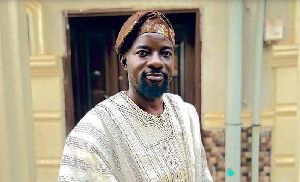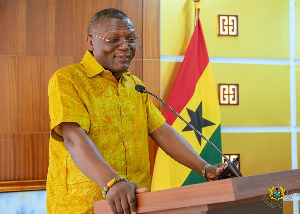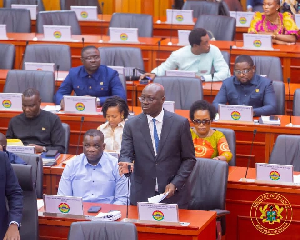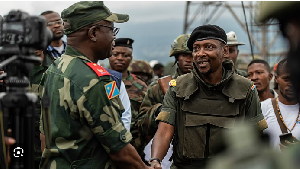Today, exactly 40 years ago, on the morning of 17th April, 1967, Ghanaians were rudely shaken out of a contented sleep by the voice of a young Lieutenant, S.B. Arthur, announcing over Radio Ghana that he had taken over the administration of the Country.
Arthur failed in the attempt and Ghanaians were soon able to heave a sign of relief. But they were to learn , to their horror, a few hours later that Lt. Gen. E. K Kotoka had been captured in the night, by Arthur's men and murdered in cold blood at the then Accra International Airport which today has been christened Kotoka International Airport in his memory.
Some Ghanaian soldiers also lost their lives with the General Officer, Lt. Gen E. K. Kotoka, during the 17th April, 1967 insurrection. They included Captain Anthony Avevor and Captain C. Y. Borkloe and the third was Kotoka's Batman, Sgt. Osei Grunshie. We salute the courage these brave soldiers who laid their lives for the defense of Mother Ghana.
On the occasion of the 40th anniversary of the death of this great hero, a requiem in his memory will be held at his home town Fiaxor in the Keta District of the Volta Region on Saturday, 21st April, 2007 at 10 am. A thanksgiving service will also be held at the same venue on Sunday, 22nd April, 2007. The media, well wishers and general public is invited to attend.
Credited to be the man who broke the myth surronding Ghana's First President Osagyefo Dr. Kwame Nkrumah, Lt-General Emmanuel Kwasi Kotoka was born at Fiaxor in the Keta District of Volta Region on 26th September, 1926 to the late Kotoka Nugbemado of Fiaxor and Etordeafiade Kpodo-Be of Alakple. He attended school at Anloga Presbyterian School and subsequently taught for three years.
He enlisted in the then Royal West African Frontier Force in July, 1947.During his short spell in the ranks, he exhibited such sterling qualities of soldiery that he won the admiration and respect of both his colleagues and superiors. He rose quickly through the ranks and became company SGT. Major in 1951-four years after enlistment he undertook overseas correspondence course and subsequently he was selected for officer cadet training at the Rost Command Training School , Teshie (now the Ghana Military Academy) between 1953 ?54 . He then proceeded to Eton Hall, Chester in 1954 and was commissioned as Lieutenant on 20th November, 1954.
Before returning to Ghana, he was attached to the 1st Battalion King?s Shrophire Light Infantry in Germany for three months.
After serving as Platoon Commander in the 2nd Battalion of Infantry, he returned to the United Kingdom in 1956 for a Mortar Course at Nether Avon, near Salisbury.
He was promoted as Captain early in 1958, later in the same year he was promoted Major. He continued with his original battalion - 2nd Battalion.
In 1960, he went with his battalion to Congo as part of the United Nations Peace Keeping Force. He saw service in Leopoldville and returned to Ghana.
In 1961, he again went to the Congo and this time saw service in Luluaborg, Kasai.
He was mentioned in dispatches in 1961, for an act of exceptional bravery. When the British left the Ghana Army, he returned to Ghana and went on the staff of the 1st Infantry Brigade Group as Deputy Assistant Adjutant and Quarter Master-General.
He was promoted Lieutenant-Colonel in September 1961 and appointed to command the 2nd Battalion. He commanded the Military Parade during the visit to Ghana in 1961 of Queen Elizabeth II.
In 1962, Lt-General Kotoka took his Battalion back to Congo for the third time and saw action in the Katanga Province. For his part in the battle of Katanga, he was awarded the Ghana Service Order.
On his arrival in Ghana in August 1963, he was appointed Quarter Master-General in the Ministry of Defense. He became General Staff Officer Grade 1 in the Ministry of Defense in April 1965. He was promoted Colonel and was appointed Commander of the 2nd Infantry Brigade Group in August 1965.
In February 1966, he successfully led the glorious revolution which overthrew the Kwame Nkrumah Regime. He was promoted to the rank of Major ?General and General Officer Commanding (G.O.C) Ghana Armed Forces immediately afterwards. He led Ghana?s delegation to the U.N in 1966.
On the first anniversary of the February revolution, he was promoted Lieutenant-General of the Ghana Armed Forces - a post he held until his death on April 17, 1967. The late General was a fine Soldier, disciplined, loyal, resolute, firm and sympathetic. All members of the public are welcome.
Issued and Signed by
Togbi Atsiflo III
Patron
FIAXOR YOUTH AND STUDENTS ASSOCIATION
PMB -Fiaxor via Anloga V/R
e-mail: fiaxoryouthass@yahoo.com 16th April, 2006 PRESS RELEASE
General News of Tuesday, 17 April 2007
Source: FIAXOR YOUTH AND STUDENTS ASSOCIATION
Arthur's Coup & Death Of Kotoka
Entertainment











